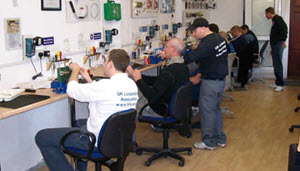The overall average cost of vocational school in the United States is about $33,000.
Although that may initially seem like a large chunk of change, the average cost of a Bachelor’s degree is $127,000.
That is a staggering difference.
With such a large cost gap, vocational school is a much more attainable option than traditional college for many people.
Additionally, many are also drawn to vocational training because you focus on learning only what you will need in your field.
Essentially, you can bypass many general education and elective courses – which are required in four-year colleges.
Different areas of study do cost a different amount, however.
Below are some of the most popular vocational school fields.
Each area of study is broken down by average cost in the United States.
Article Table of Contents
Electrician
Most electricians start their careers after attending a trade school, community college, or apprenticeship program.
Electrician training can last anywhere between a few months and five years.
Tuition costs vary depending on the program, the credential it leads to, and its duration.
Certificate programs range from less than $5,000 to $10,000, while two-year associate degree programs are above the $10,000 mark.
Prospective electricians who want to learn this trade on the job have the option of attending apprenticeship programs that last four or five years.
Apprenticeship fees typically sum up to less than $1,000 per year, and most trainees are paid for the work done during the on-the-job training part.
Interested in online electrician classes?
Read: Online Electrician Training Programs – Get Your Certification Online
Plumber
Plumbers complete their training at a community college, trade school, or apprenticeship program.
Apprenticeships usually last up to five years, while certificate programs take one year or less to complete.
The plumbing curriculum usually covers pump system design, blueprint reading, basic electricity, pipefitting, and other related topics.
Apprenticeship programs combine classroom training with on-the-job hands-on instruction.
Although it takes longer to complete, an apprenticeship gives students the chance to earn a salary while learning.
Training costs range from less than $1,000 to more than $20,000.
Online plumbing programs that cover the basics of the plumbing trade are available at some schools and usually cost less than $1,000.
Certificate program range from $1,000-to $3,000, while two-year associate degree programs are between $3,000-$23,000.
Apprentices also have to pay a yearly fee typically sum up to less than $1,000.
Welder
Welding-related skills are usually learned during high school or through post-secondary education.
Trade schools across the nation offer certificate programs that can teach theoretical concepts while also providing students with hands-on training experience.
Many schools are now also offering their theoretical welding studies done online, so before you get the experience you need, you can complete an online certification program through which you can become a certified welder.
Two-year college programs that lead to an Associate of Applied Science Degree are also available at community colleges.
High school graduates who want to become engineers also have the option of enrolling in a Bachelor’s degree program that lasts four years.
Many welders start their career through an apprenticeship program that takes between 3-5 years to complete.
Training costs vary widely depending on the type of program and the school.
Welding diploma and certificate programs usually cost less than $10,000, while four-year college programs range from $40,000-$100,000.
HVAC Technician
HVAC technicians need to complete a technical education program in ventilation and heating, air conditioning, and refrigeration.
Most workers in this profession learn their skills at a trade school, community college, or through an apprenticeship.
Certificate programs are usually less than one year long and can cost anywhere between $1,000-$15,000, depending on the school, you can also find online HVAC certification programs that can be done from home and at your own pace.
Associate degree programs range from $15,000-$35,000 and can be completed in two years.
HVAC apprenticeships usually last 3-5 years and cost approximately $500-2,000 but, during this time, most trainees receive a salary.
Apprenticeships combine classroom education with on-the-job training.
Auto Mechanic
Auto mechanics complete their training at vocational high schools, trade schools, or community colleges.
There are also online programs that offer coursework in the field of auto mechanics and cost between $750-$1000.
Certificate programs range from $5,000 to $20,000, depending on the school.
Two-year associate degree programs are also available and can cost between $10,000 and more than $20,000.
Although certification is not required, auto mechanics can earn a credential offered by institutions such as the National Institute for Auto Service Excellence if they pass a test.
Certification testing fees range from $30-$100.
Read the full guide: How to Become an Auto Mechanic
Phlebotomist
Phlebotomists are trained professionals who draw blood for tests, transfusions, research, or blood donations.
Phlebotomy training can be completed online or in-person through a post-secondary program.
These programs are available at vocational schools, community colleges, or technical schools and usually take less than one year to complete.
Certification is not usually required, but some employers prefer to hire phlebotomists certified by the National Center for Competency Training, the National Healthcare association, or a similar organization.
Phlebotomy training costs range from less than $500 for online phlebotomy training programs to more than $20,000 for programs that lead to a medical assistant degree.
Culinary School
Culinary school is a wonderful schooling option for those who wish to become a professional chefs.
Hundreds of culinary schools are scattered all across the United States.
You can choose to study in The Big Apple (NYC), at the beach in LA, or anything in between.
Although different schools will have different tuition, the average cost for a culinary arts certification is around $17,000-$47,000.
With a relatively large tuition range, you can find a culinary school to fit your budget.
Tuition is generally comprised of preparing entrees and desserts, mastering knife skills, plating food, menu designing, and learning about exotic cuisines.
Culinary school can last anywhere from 7 months to 4 years, making tuition costs fluctuate between different schools and programs.
Real Estate
Many may not automatically think of real estate agents and vocational schools as a couple.
However, there are specific real estate schools for individuals looking to become agents or brokers.
Like with all vocational schools, the price will vary from state to state and between training programs.
Typically, there is not one complete fee for one schooling program.
There are multiple fees across different areas that comprise the total cost of becoming a real estate agent.
For all intents and purposes, in the state of Colorado after schooling, fees, final exam cost, etc. the total comes to around $2,923.
Although the final price will vary between states, it is safe to say the running total will end around this number.
Being a property manager is also a high-paying profession you may consider.
Massage Therapy
Most states in the US require an average of 500 to 600 hours of schooling to become a licensed massage therapist.
Depending on your state and choice of schooling program, the total cost ranges from $4,000 to $25,000.
Completing the training will provide you with a certificate as a certified massage therapist in your state of choice.
If you are looking to become certified in more than one state, or nationally, then vocational school costs will increase.
See massage therapy programs by state here >>
Information Systems

Information systems encompass a wide range of topics in the IT industry.
Information systems include but are not limited to:
- Web design and development
- Operating systems
- Network administration and application of wireless networks
- Programming
- Security analyst
- E-commerce
- Software development
- Data communications
Although specific pricing will depend on what exact area of study you are looking to complete and the type of school, the average cost for an IT/Information Systems degree is $3,000 to $20,000.
Locksmith
Locksmithing is an interesting trade, on average a locksmith earns $46,504 a year.
There’s an opportunity to gain experience and training in the field through apprenticeships.
Online training for locksmiths can be as little as $400, in more professional schools, a good locksmithing program can cost around $4,200.
On average, locksmithing training costs $1,700-$2,800.
Final Thoughts
Vocational training school costs are normally around average but it can differ…
…depending mainly on your:
- Location
- Profession Chosen
- With/Without Financial Aid
- etc…
Good luck!
Frequently Asked Questions
How much does vocational school cost?
The average cost of a vocational school in the United States is $33,000, but tuition expenses vary widely depending on the program and the curriculum.
Massage therapy programs, for example, can usually be completed in less than one year and cost between $4,000-$25,000.
There are also trades, such as locksmithing, that can be learned through an online training program that costs less than $1000.
Some professions also require a license that can be earned after passing a state exam.
Exam fees are usually less than $100.
Is an apprenticeship a better option than a trade school?
While the skills needed for some professions can be learned through vocational training programs that last only a few months, apprenticeships are a viable solution for other career paths.
This also depends on each students’ budget, schedule, and professional aspirations.
Apprenticeship programs include a significant part of on-the-job instruction.
For this reason, they take more time to complete, but during this time trainees typically earn a salary that increases as they progress in their training.
What is the difference between vocational training and academic programs?
Vocational training programs usually focus only on the topics that are relevant to the career field, while four-year colleges also include general education courses and electives.
Many vocational schools combine classroom instruction with hands-on training and can be completed in less than two years.
After graduating from a vocational school, students have a certificate, diploma, or associate degree (depending on the program) and are ready for entry-level employment in their field.
Is vocational training a guarantee for a rewarding career?
While the answer to the above question depends on each students’ commitment and skills, a variety of in-demand professions can be learned through vocational training.
According to the Bureau of Labor Statistics, the electrician profession is projected to grow 9 percent from 2020 to 2030 while the barber profession will grow 19 percent during the decade.
Some successful electricians have completed their training at a vocational school, while others attend an apprenticeship or four-year college program.
The same thing applies to many other professions.
How much time does vocational training take?
Vocational training can last between a few months and more than two years.
Some online programs can be completed by students at their own pace in less than one month, while programs that lead to an associate’s degree are two years long.
Students who want to earn a salary while training for a new career have the option of applying for an apprenticeship.
Apprenticeships are usually between 3 and 5 years long, depending on the specialty.










I am a Journeyman Diesel Mechanic and have worked in and managed shops all over the USA.
I would prefer to hire someone with some mechanical aptitude and apprentice them as see them spend their money on a school that won’t elevate them in their field of endeavor. Okay, that being said; if they don’t have a clue where the dipstick on their car is then by all means go to tech college. When talking about the cost of a 4 yr bachelor’s degree versus a 1 yr tech school please factor in the cost of those shiny tools u will need $70.000 and up.
My highest paid mechanic did over $160.000 in 2019 working over 60 hrs/wk.
Downside; look at a mechanic at age 65 then look at your banker with a college degree at age 65.
I am not degrading the trades as I would probably do it all again just want everyone to go in with eyes open.
When my friends heard I am opting for a local school over a university or college campus, they kind of laughed at me. Having seen my brother end up in nearly $100,000 in debt and still living at home basically woke me up to the reality. My father is not happy with my choice but my mother understands. She doesn’t want me to be stuck in mounds of debt like my brother.
Culinary school is not worth it unless you either get famous, working for someone who is famous as a private chef, or plan on owning a restaurant. I have been through the training. I am currently making $34,000 a year as a head chef at a local restaurant.
I love working with food and cooking in general but this is not enough for me to live on my own. I am currently living with my sister who is making more than I am as a blogger. Great list but I just want people to be aware that most trained chefs don’t make a whole lot.
I know someone who has been doing it for 30 years and doesn’t even make $50,000 a year.
I intrested to learn vocational class . Iam from Cincinnati Fairfield ohio